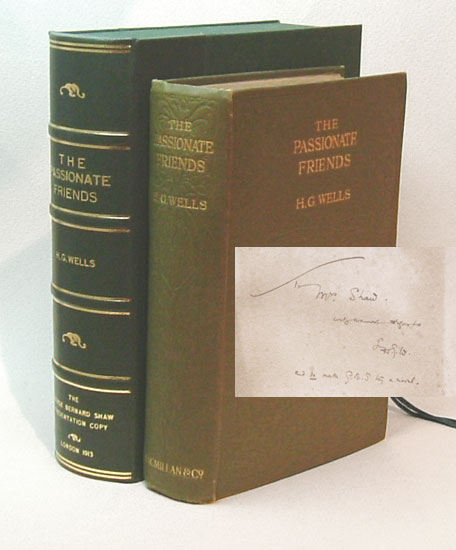Available Copies from Independent Booksellers

H.G. Wells. The Passionate Friends (inscribed copy). macmillan, 1913.
Price: US$1300.00 + shipping
Condition: Very Good
Description: Wells, H.G. The Passionate Friends. London, MacMillan and Co., 1913, 1st ed., (8),356,4,7(advert.)p., orig. giltlettered and blindst. cl., t.e.g. = The first edition, with an AUTOGRAPH DEDICATION MONOGRAMMED "H.G." to E.A. BENNETT: "E.A.B. who misses three things in it [monogram]." G.H. Wells, Bibliography 49.
Seller: Neverland Books, waalre, Netherlands

WELLS, Herbert George. The Passionate Friends: A Novel. MacMillan and Co., Limited, 1913.
Price: US$2587.23 + shipping
Condition: Very Good
Description: AUHTOR'S PRESENTATION COPY. WELLS, Herbert George. The Passionate Friends: A Novel. London, MacMillan and Co., Limited, 1913. £2000 FIRST EDITION. 8vo, original green vertically ribbed cloth, spine and front board with gilt lettering and vine motifs in blind, top fore-edge gilt. Light wear to joints, corners and spine caps. A Presentation copy, affectionately inscribed by the author to his friend Daisy Blumenfeld: D. B. / from Herbert George / and someday we will win at tennis. Even though we could not find much information on Daisy Blumenfeld, it is known that she was a good friend of Wells and they corresponded frequently. She appears in The Correspondence of H.G. Wells, edited by David C. Smith and Patrick Parrinder (London, 1998).
Seller: Symonds Rare Books Ltd, London, United Kingdom

Price: US$45000.00 + shipping
Description: 1st Edition. Hardcover. Signed by Author. The [GB] Shaw Copy. First edition, first issue with all the correct points. A fine copy in the publisher's patterned sage green cloth, stamped in gilt and blind. [very minor offsetting to the endpapers & a small stain at the outside bottom of the front pastedown - still a remarkable fresh copy & an extraordinary example, Inscribed by Wells with a flourish for Charlotte Shaw & George Bernard Shaw through her with good humored advice as follows: "Mrs. Shaw / with warm regards / HGW / and do make GBS try a novel" - The inscription in rebuttal to Shaw having earlier admonished Wells to try writing a play. Green calf clamshell protective presentation case, gilt decorated & lettered at the spine. THE PASSIONATE FRIENDS was produced as a movie by Stoll in 1923, again by David Lean in 1948 (script by Eric Ambler), & again by Paramount in 1952. Wells Soc. 51; Hammond A9. "Bernard Shaw and H. G. Wells were both dedicated to reshaping the world: as Shaw commented in one letter to Wells, " The first volume of [Karl Marx's] Capital (all I ever read of it) changed the mind of Europe; a thing we two have been trying to do all our lives." 1 Although (apart from some satiric fantasies) Back to Methuselah is Shaw's only direct attempt to picture what this change might mean, H. G. Wells was very much in the futures business with almost a third of his voluminous writings being explorations from the present into visionary alternatives. Titles like The World Set Free or Men Like Gods offer much the same ecstatic hope for change as Shaw's "metabiological Pentateuch"; and a comparison between the ways in which each envisaged the future is illuminating. It encapsulates the extremes of the turn-of-the century revolutionary movement in which they were both involved, as well as throwing the nature of Shaw's beliefs into high relief by the contrast. The links between the two writers, both of whom aspired to be the intellectual leader of the new century, are well known: their common membership in the Fabian Society, and the Wells forced resignation after publicizing the scandal of his affair with Amber Reeves (at that time the secretary of the Society) in his novel Ann Veronica, their extensive correspondence from at least 1901 right up to just three days before Wells' death in 1946, which shows that each read the other's work, even sending drafts of some pieces to one another. What has not been as fully realized is the degree to which both Wells' novels and Shaw's plays were written as direct responses to each other's work. There are enough overlaps or cross-references to qualify several of their works as a serious literary conversation, and significantly, the subject of their artistic argument was specifically their idea of the perfect society, and the means through which it might be." - Innes, C. D. "Utopian Apocalypses: Shaw, War, and H. G. Wells" SHAW The Annual of Bernard Shaw Studies - Volume 23, 2003, pp. 37-46, Penn State University Press.
Seller: TBCL The Book Collector's Library, Montreal, QC, Canada